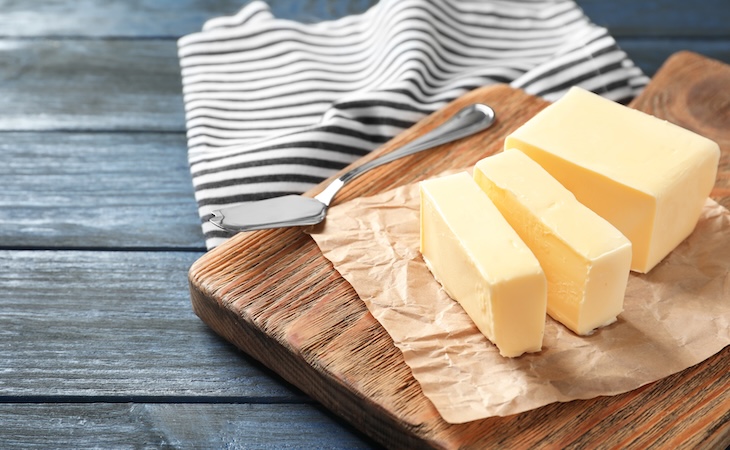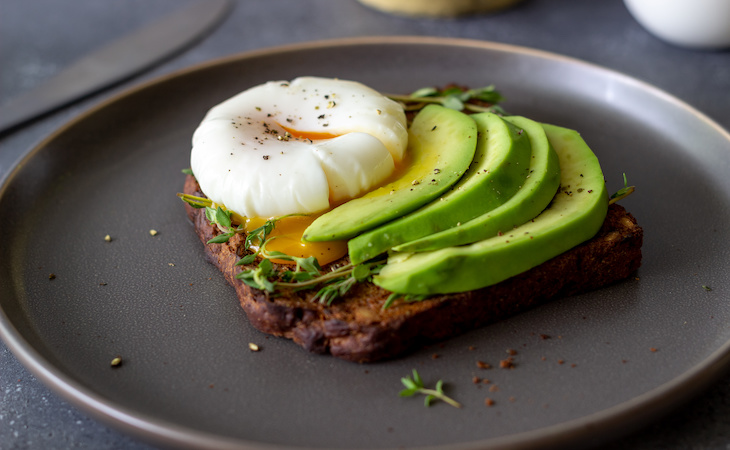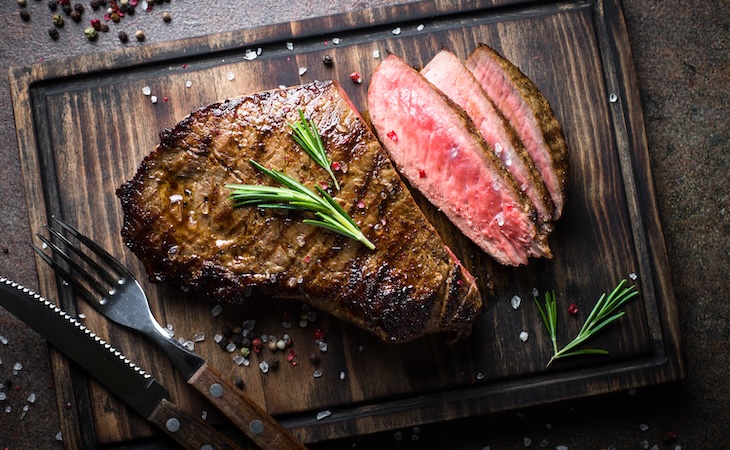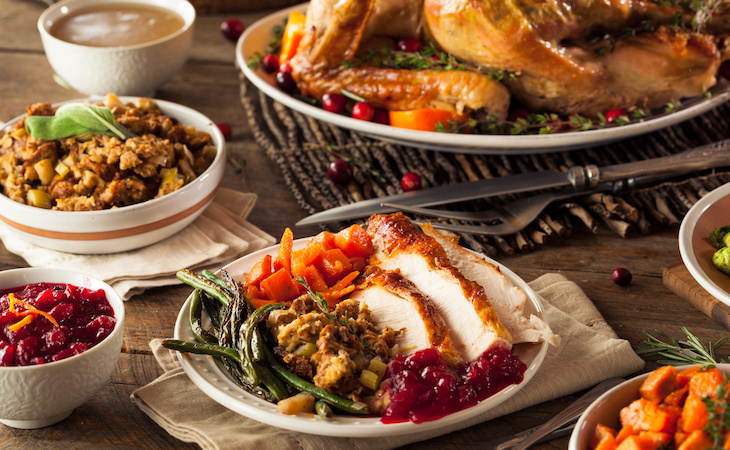There’s been a lot of buzz on social media lately about eating a spoonful or a few bites of butter before bed. Some say it’s worked wonders for their sleepless nights. The idea is simple and intriguing, but is there any truth behind the claim?
Can butter help you get better rest, or is it just another trend? Here’s everything you need to know about eating butter before bed and whether it could impact your sleep.
The nutritional profile of butter
Butter is high in calories and fat, with a tablespoon of unsalted butter providing 102 calories, 11.5 grams of fat, and less than half a gram total of protein and carbs. [1]
Most of the fat is saturated fat. While fat is essential for energy and absorbing certain vitamins, consuming too much of certain fats, like saturated fat, can raise LDL (“bad”) cholesterol and increase the risk of heart disease and stroke. [2, 3]
Butter offers little nutritional value but does provide about 11% of the daily value for vitamin A, which supports vision and organ health. [1, 4, 5] You can easily get vitamin A from nutrient-rich foods like sweet potatoes, carrots, and fortified milk. [5]
Potential benefits of eating butter before bed
No studies prove butter helps with sleep, but a small amount before bed may help some feel satisfied and prevent hunger. It might also feel comforting, with some people experiencing a placebo effect from believing it helps.
Potential risks of eating butter before bed
Some good sleep habits for a better night’s rest include avoiding heavy meals and maintaining a healthy diet. [6] While a small amount of butter doesn’t define whether a diet is healthy or count as a heavy meal, it’s still important not to overdo it.
Although there isn’t research on butter’s effects on sleep, some studies have looked at link between nutrition and sleep.
A review found that eating more saturated fat is linked to poorer sleep, with less deep sleep and more difficulty falling asleep. On the other hand, eating healthier unsaturated fats is linked to better sleep and falling asleep faster. [7]
If you have digestive issues, be mindful of what you eat as it can disrupt sleep. [8] Fatty or greasy foods, like butter, can trigger indigestion, so keep portions small if you try it before bed. [9]
Comparing butter with other evening snacks
When thinking about nighttime snacks, it’s worth comparing butter to alternatives with better sleep benefits.
Butter vs. nut butters
Nut butters like almond and peanut butter provide healthy unsaturated fats that may improve sleep. [7, 10] Unlike butter, they also contain protein and fiber to help you feel fuller. [11]
Although it’s a small amount, nut butters offer more tryptophan—a protein building block your body uses to produce melatonin and serotonin, hormones vital for sleep—than butter. [1, 12, 13]
Butter vs. cheese
Cheese contains a small amount of tryptophan, though more than butter, as well as protein. [14]
Some studies suggest milk and dairy products like cheese may support sleep, possibly due to their tryptophan and antioxidant and anti-inflammatory properties. [15]
Butter vs. herbal teas
Herbal teas are caffeine-free and can be calming, with the act of sipping helping you relax. Chamomile, in particular, has compounds that improve sleep, reducing awakenings during the night. [16]
Lavender, found in some teas, may help with anxiety, which can also improve sleep quality. [17] Butter contains none of these sleep-enhancing compounds.
Tips for including butter in your nighttime routine
If you’re curious about trying butter as a nighttime snack, here are some helpful tips:
- Keep it small: A tablespoon or bite-size is enough.
- Pair with whole grains: Try toast or crackers.
- Eat with fruits/veggies: Try apple slices or carrots.
- Combine with protein: Add a small amount of nuts or cheese.
The bottom line on eating butter before bed
Butter may provide comfort, but it lacks proven sleep benefits. Nighttime snack options like nut butters, cheese, or herbal teas may be more effective.
If you choose to try butter before bed, keep portions small and be mindful of your overall diet and digestive health for the best results.
FAQs
Is butter OK before bed?
Butter can be eaten before bed, but it has no proven sleep benefits. Keep portions small to prevent digestive discomfort and avoid excessive saturated fat intake.
Why does butter make you sleepy?
Butter may help some feel full, preventing hunger from waking them. However, the sleep benefit could be due to a placebo effect, where people feel better because they believe it helps.
What effect will a nighttime banana have on your sleep? Here’s what happens when you eat a banana before bed.
References
- U.S. Department of Agriculture: FoodData Central: Butter, without salt. https://fdc.nal.usda.gov/food-details/173430/nutrients
- MedlinePlus. Dietary Fats. https://medlineplus.gov/dietaryfats.html
- American Heart Association. The Skinny on Fats. https://www.heart.org/en/health-topics/cholesterol/prevention-and-treatment-of-high-cholesterol-hyperlipidemia/the-skinny-on-fats
- Food and Drug Administration. Daily Value on the Nutrition and Supplements Facts Labels. https://www.fda.gov/food/nutrition-facts-label/daily-value-nutrition-and-supplement-facts-labels
- National Institutes of Health: Office of Dietary Supplements. Vitamin A and Carotenoids: Fact Sheet for Health Professionals. https://ods.od.nih.gov/factsheets/VitaminA-HealthProfessional/
- Centers for Disease Control and Prevention: Sleep. About Sleep. https://www.cdc.gov/sleep/about/index.html
- Wilson, K., St-Onge, M. P., & Tasali, E. (2022). Diet Composition and Objectively Assessed Sleep Quality: A Narrative Review. Journal of the Academy of Nutrition and Dietetics, 122(6), 1182–1195. https://doi.org/10.1016/j.jand.2022.01.007
- Hyun, M. K., Baek, Y., & Lee, S. (2019). Association between digestive symptoms and sleep disturbance: a cross-sectional community-based study. BMC gastroenterology, 19(1), 34. https://doi.org/10.1186/s12876-019-0945-9
- NIH: National Institute of Diabetes and Digestive and Kidney Diseases. Symptoms & Causes of Indigestion. https://www.niddk.nih.gov/health-information/digestive-diseases/indigestion-dyspepsia/symptoms-causes
- U.S. Department of Agriculture: MyPlate. Rethink Fats. https://www.myplate.gov/tip-sheet/rethink-fats
- Njike, V. Y., Smith, T. M., Shuval, O., Shuval, K., Edshteyn, I., Kalantari, V., & Yaroch, A. L. (2016). Snack Food, Satiety, and Weight. Advances in nutrition (Bethesda, Md.), 7(5), 866–878. https://doi.org/10.3945/an.115.009340
- U.S. Department of Agriculture: FoodData Central: Peanut butter, smooth style, without salt. https://fdc.nal.usda.gov/food-details/172470/nutrients
- MedlinePlus. Tryptophan.
- U.S. Department of Agriculture: FoodData Central: Cheese, cheddar, sharp, sliced. https://fdc.nal.usda.gov/food-details/170899/nutrients
- Komada, Y., Okajima, I., & Kuwata, T. (2020). The Effects of Milk and Dairy Products on Sleep: A Systematic Review. International journal of environmental research and public health, 17(24), 9440. https://doi.org/10.3390/ijerph17249440
- Kazemi, A., Shojaei-Zarghani, S., Eskandarzadeh, P., & Hashempur, M. H. (2024). Effects of chamomile (Matricaria chamomilla L.) on sleep: A systematic review and meta-analysis of clinical trials. Complementary therapies in medicine, 84, 103071. https://doi.org/10.1016/j.ctim.2024.103071
- NIH: National Center for Complementary and Integrative Health. Lavender. https://www.nccih.nih.gov/health/lavender




